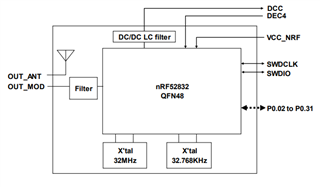I have a custom designed PCB that has the nRF52832 (taiyo yuden EYSHCNZWZ) on board.
When I flash the board using pogo pins and the jlink (debug out) from a nRF52DK, everything works as expected. However, if I power off the board, and the power it back on, the board does not seem to boot (advertising led not blinking).
I can't really debug this, as it works normally when the jlink is connected and I can see printfs.
Any idea on what could be the issue? Thx!



